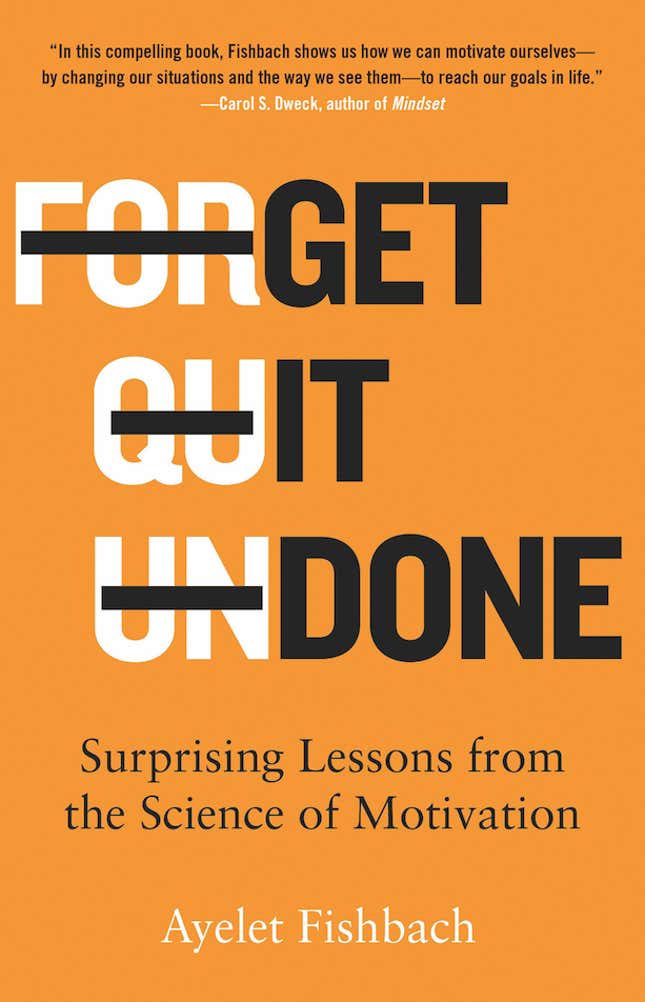Ayelet Fishbach took a cue from her own life when she decided 20 years ago to study the science of motivation. She was a student then, working on a PhD in social psychology at Tel Aviv University, and she noticed how easily her commitment to studying could be disrupted. Why wasn’t she more focused on her goals?
She looked for scholarly work on the subject and found a few older studies, “but there was not much research on motivation within social psychology,” she says, ” so I had to develop the paradigm and ask empirical questions.” She began with questions about temptation.
Since then, motivation science has blossomed into its own field within social psychology, and Fishbach, now a professor at the University of Chicago Booth School of Business, is a world leader within it. Her research has been cited in several popular psychology books, and her first book for a lay audience, Get It Done: Surprising Lessons from the Science of Motivation (Little, Brown Spark) will be published in January 2022. She says she hopes it will help people learn not only how to get out of their own way, but also how to enlist help from others to stay focused.

Get It Done is not only fascinating for its science; it’s a deeply engaging read. Fishbach weaves together short narratives, insights from fables and philosophy, and findings from her experiments on incentives and other aspects of motivation. The book’s chapters—on topics like self-control, patience, relationships, and negative feedback—each end with a series of questions, guiding the reader to a new framework through which to understand their own behavior.
Quartz recently spoke with Fishbach about why motivation is such a hot topic right now, whether women and men approach motivation differently, and the difference between goals and chores. The interview was lightly edited for length and clarity.
Quartz: Research on motivation was rare or nonexistent when you were getting started. Now it’s everywhere. What changed?
Ayelet Fishbach: My interpretation is that, as a field, we are very attuned to whatever is on the mind of society, to whatever it is that people are struggling with. Social psychology started after World War II, when we tried to address questions about racism and stereotyping, and the perceptions of social groups. Unfortunately, this question has never gone away.
The modern lifestyle makes us much more aware of motivation. Most of us have more control over our lives than previous generations did. There is a shift in society where we are much more in control of what we do. That means that we need to decide what we want to do and then motivate ourselves to get there.
Before the pandemic, I would go to the office and someone else would have helped me stay motivated. Now most of us, at least for some of the time, work at home and we know: I need to get up in the morning and either stay in my pajamas or get out of my pajamas and, somehow, start working. I know how much I can motivate myself will determine how well I do at my job and how much I achieve in life. These are very modern questions.
Your book advises people to set goals rather than create chores. What’s the distinction you’re making?
When we set a goal, it’s usually because we are conflicted; we are not sure that we want to do it. I set a goal to exercise daily, because I don’t think I will exercise daily unless there is a goal. I’m probably not sufficiently excited to do it without setting a goal. So, it’s very intuitive for us to think about goals as chores: “This is what I have to do in order to be healthy, or to be successful.”
But it tends to fail because the truth is that we are not very excited about these goals when we are pursuing them. In the book, I suggest that to the extent you can set your goals such that it’s less of a chore, and more of this exciting thing that you want to achieve, you have a better chance of achieving it.
It’s more exciting to think “I’m going to stay in shape” than to think “I will wake up early every morning and run.” Or maybe running is just not exciting for you and then I would say to play frisbee. Find a way that makes it less a chore and more a part of your day. Otherwise, you’re just not doing it.
Are there substantial differences by gender when it comes to motivation and goal-setting?
There are differences between the goals that men and women take on. But often when we control for context, we see that the mechanisms are very similar.
To give you an example, there’s much research showing that women are not as good salary negotiators as men. They don’t motivate themselves to ask as much as men are willing to ask; they don’t work as hard to get what men are willing to work for.
But when you look at it more carefully, you see that often it’s because of the context. If you put women in a situation in which they would feel more entitled, or if they negotiate for someone else—which is something that we as women learn that we should do, fight for other people more than for ourselves—then they use the same tactics, and they feel very motivated.
We also see that, for women, having children often interferes with their career, in a way that it doesn’t for men. Many women perceive the family and those duties as competing with being a successful professional, while many men see it as complementing being a successful professional.

I was surprised to see a section on relationships in a book about motivation. It’s not something that comes to mind when I think about romantic partnerships.
Well, in romantic relationships, we often connect with people who help us with our goals, and we move away from people who don’t help us with our goals or who inhibit our goals. We often see breakups happen when the person is no longer instrumental for my goals, or I wasn’t instrumental for their goals.
In the movies, we see this ideal situation of people staying connected with their high school friends for the rest of their lives and then we wonder, “How come in my life, my high school friends are no longer the people that I see?” And this is because when your goals change, when your motivation changes, there are other people that support that.
So how does this work within couples?
There are some couples who work on goals together. And I’ve talked with some researchers about how couples do that and how much they tend to allocate some of the work to one person. But it can create problems. It’s might be efficient for the system, for the couple, but not for each person within the couple.
Let’s say my partner and I might move to a city because I have a job that I know will get me a much higher salary, but he will be unemployed. Now, many couples go for this. They look at the total income and say “Well, our joint bank account will have more if we do that.” But then one person just got the best deal of their life, and the other person is unemployed. So how do you address this tension between what’s good for the system and what’s good for each person?
Does that kind of thing happen in the workplace, too, where one person gets stuck and begins feeling resentful?
Absolutely. One example is that one person might just do things better—more efficiently, let’s say. So we give you more work because it’s efficient for the system, but it might not work for you.
I can go even broader than the workplace. We say that the economy is growing and that’s good for society, but that means that some people and some companies are doing very well, while others are not doing as well. We also need to think about who gets what.
What are some of the fallacies about motivation that you see being repeated and shared?
I don’t know if this is the most important one, but it’s one that I just saw this week. Apparently many people believe that if you imagine yourself succeeding, that will create success. Fantasizing about being in great shape will motivate you to exercise. Fantasizing about being in a relationship will make you more likely to meet your partner. And that’s just not true.
Making a plan—knowing “This is what I’m going to do”—has been shown to increase motivation. Fantasizing about how great it would feel to be there in your future ideal state undermines motivation. It elicits daydreaming, and it doesn’t translate into action.
In the book, you describe an exercise where you ask groups of management students to decide what they would salvage after a floatplane crash. Some of the objects would allow them to stay warm and wait to be rescued and others could be used to trek out of the woods. But you write that the students tend to grab an “eclectic array of items that serve opposite purposes.”
I love this exercise because it turns out we can have a discussion for half an hour about what we are going to pack without thinking about why are we packing it. Are we planning to stay put somewhere? Do we plan to venture? You might say “We need to pack our hiking shoes.” And I might say “Yeah, sure let’s take our hiking shoes,” even though I plan to sit on the beach.
It’s unfortunately too tempting to just do things without thinking about what you’re trying to achieve, without having a plan. It’s this lack of planning, lack of identifying goals, that lead people to just spread out over too many things.
I can see how teams or organizations could make that mistake. What does it look like when we do that on an individual level?
Clearly, one dysfunctional example is that I might decide to start to eat healthily and sign up for a baking class in the same week.
At work, you might not set a goal. We often look at the conflict between setting your priorities versus what’s urgent. If you are juggling many tasks at work, you might find yourself never doing what is a high priority for you, because there are urgent things. Now, if we did not do the exercise of “Let’s sit down and decide on our priorities,” you might be constantly doing the low-level urgent stuff because those tasks are about to expire.
It makes sense to do this exercise from the management’s perspective, too, because maybe the reason I hired you is to start a new project, but you just never got a chance to do it because I constantly give you more urgent tasks. It’s a good idea for us to have this conversation every month or quarter: “Here are the priorities. Are you working on this, or are you just dealing with the daily urgent stuff?”
The thing about urgent stuff is that, as we know, sometimes when you don’t do it, it’s fine. It goes away.
You also talk about how it’s easier for people to learn from positive feedback. If you manage direct reports, should you try not to give negative feedback?
Positive feedback is better at increasing commitment. However, managers should know how to give negative feedback, too. It has good information. But it has to come in a context in which the person is secure enough to hear it, is able to process it. It can be delivered with some guiding questions—Where do you think that you can improve? What are the things that you think are difficult for you?—and then builds on their self-insights to deliver feedback.
But as the manager, I should assume that you are not listening very well when I give you negative feedback.
Why is it so hard to hear negative feedback, even when you’re supposedly motivated to do better?
Mainly for two reasons. One, it’s unpleasant. That person in me that really cares about my ego just stops listening as soon as you say that you have something bad to tell me. I don’t want to hear it.
The other reason is that it is cognitively harder.
When we get negative feedback it’s usually because we tried something and it didn’t work. It’s like learning by elimination. You think “That thing that I tried doesn’t work so there must be another thing that is the right thing to do.”
In the book, I give the example of training your pet. Pets don’t understand negative feedback. They understand that you are upset, but they think “If I should not do this, then what should I do? If I should not pee on your carpet, where should I pee?”
It’s not something that a dog can figure out by themselves. People are better, but it’s still hard.
